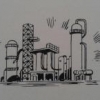Latest Downloads
-
 Water Bath Indirect Heaters
Water Bath Indirect HeatersArt Montemayor - Oct 12 2018 02:35 PM
-
 Petroleum: A Primer for Kansas
Petroleum: A Primer for KansasArt Montemayor - Oct 12 2018 02:27 PM
-
 Spray Tower for Flue Gas Scrubbing Design
Spray Tower for Flue Gas Scrubbing Designankur2061 - May 02 2018 02:31 PM
-
 Selection of Vertical Tanks
Selection of Vertical Tanksankur2061 - Apr 19 2018 07:42 AM
-
 Pressure Drop Calculator for Strainers 1
Pressure Drop Calculator for Strainers 1ankur2061 - Mar 24 2017 02:04 PM
-
 Horizontal Pig Trap System Design Guidelines
Horizontal Pig Trap System Design Guidelinesankur2061 - Jan 14 2017 02:54 PM
-
 Performance Prediction of 3-Stage Propane Refrigeration System
Performance Prediction of 3-Stage Propane Refrigeration Systemankur2061 - Aug 08 2016 02:43 PM
-
 Centrifugal Pump Troubleshooting Checklist
Centrifugal Pump Troubleshooting Checklistankur2061 - Dec 17 2015 08:18 AM
-
 Compressor Troubleshooting Checklist
Compressor Troubleshooting Checklistankur2061 - Sep 08 2015 11:43 AM
-
 Amine Sweetening Unit Preliminary Design
Amine Sweetening Unit Preliminary Designankur2061 - May 19 2015 09:35 AM
Popular Store Titles
 Tank Jacket Calculator
Tank Jacket Calculator
 Specification Sheet Collection
Specification Sheet Collection
 PIPESIZE
PIPESIZE
 Relief Valve Sizing
Relief Valve Sizing
 Rupture Disc Sizing
Rupture Disc Sizing
Chemical and Process Engineering Resources
Submitted Chris Haslego, Nov 21 2011 11:21 AM | Last updated Nov 21 2011 01:29 PM
| Category: | Fluid Dynamics |
| Question: | What are some factors to consider when trying to choose between a dry screw compressor and an oil-flooded screw compressor? |
| Keywords: | v1i12,screw,compressor,compressors,oil,flooded,dry,choosing |
| Answer: | Screw compressors utilize a pair of "meshing" helical screws to compress gases. These types of compressors a generally appropriate for a flow range of 85-170 m3/h (3000-6000 acfm) and discharge pressures in the range of 2070-2760 kPa (300-400 psig). As the name implies, dry screw compressor run dry while oil-flooded compressors use oil for bearing lubrication as well as to seal the compression chamber. The oil also carries the heat from the compression away from the compressor. This heat is typically rejected to an external heat exchanger.Some factors to consider when choosing between the two types of screw compressors include:Is the process gas compatible with the oil? --If the answer is no, use dry typeDoes the process gas have to be oil free? --If the answer is yes, use dry typeIs efficiency the top priority? --If the answer is yes, use oil-flooded typeAre you looking to minimize shaft-seal leakage? --If the answer is yes, use oil-flooded typeAre there any liquids in the incoming gas? --If the answer is yes, use oil-flooded typeDoes the gas contain small particulate matter? --If the answer is yes, use dry typeThese and other guidelines can help in choosing between the two types of screw compressors. |
| Images: |
Forum Quick Links
Tech Q & A Category List
-
 Bulk Solids
Bulk Solids
-
 ChE Outside the Plant
ChE Outside the Plant
-
 Chemical Process Business
Chemical Process Business
-
 Chemistry Basics
Chemistry Basics
-
 Corrosion
Corrosion
-
 Equipment Design
Equipment Design
-
 Experimentation and Testing
Experimentation and Testing
-
 Fluid Dynamics
Fluid Dynamics
-
 Heat Transfer Technology
Heat Transfer Technology
-
 Industrial Utilities
Industrial Utilities
-
 Mass Transfer
Mass Transfer
-
 Physical Property Information
Physical Property Information
-
 Plant Basics
Plant Basics
-
 Plant Economics
Plant Economics
-
 Preparing to Become an Engineer
Preparing to Become an Engineer
-
 Process Control
Process Control
-
 Reactions and Processes
Reactions and Processes
-
 Refining
Refining
-
 Safety
Safety
-
 Separation Technology
Separation Technology
-
 The Environment
The Environment
-
 Thermodynamics
Thermodynamics

 FB
FB



0 Comments